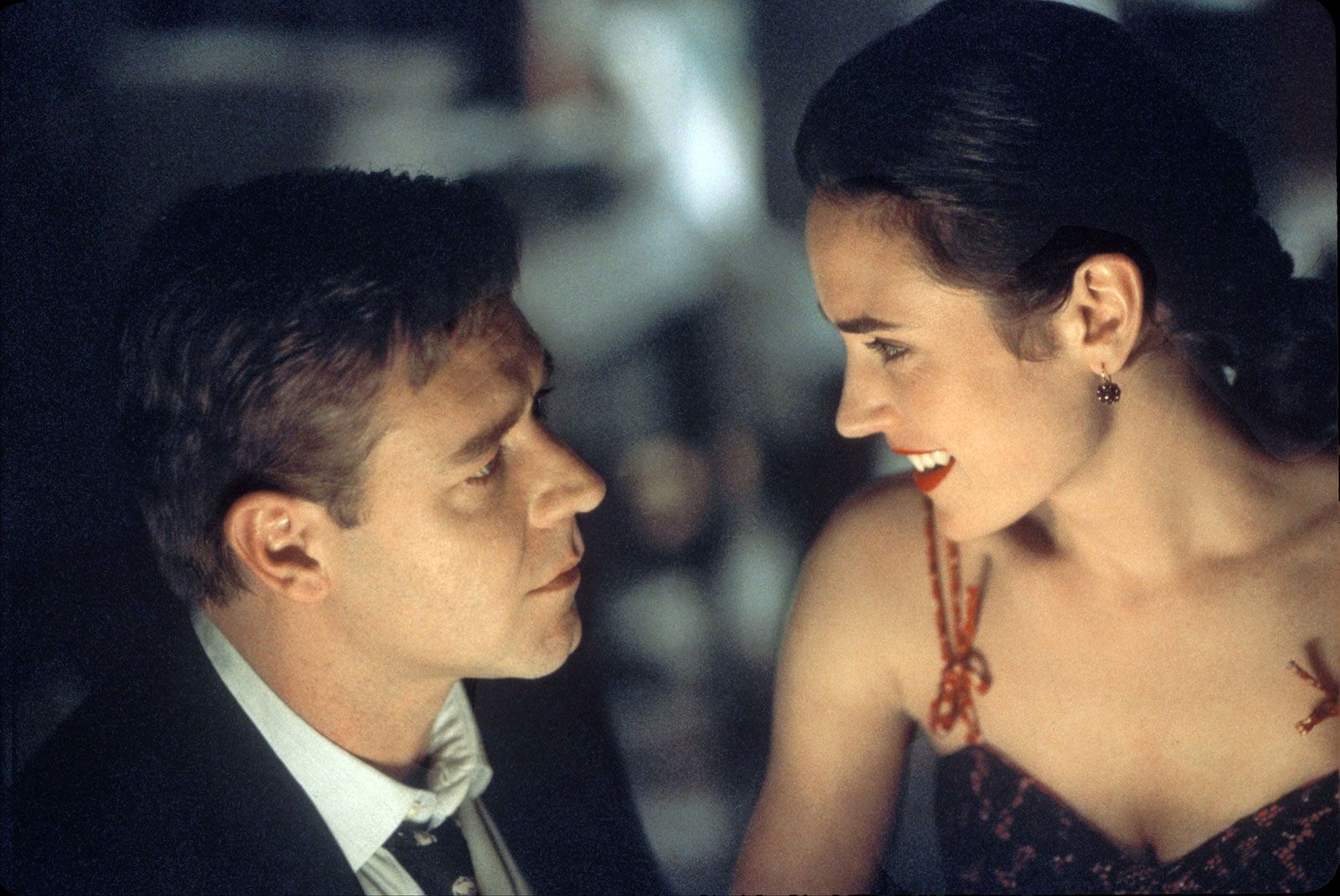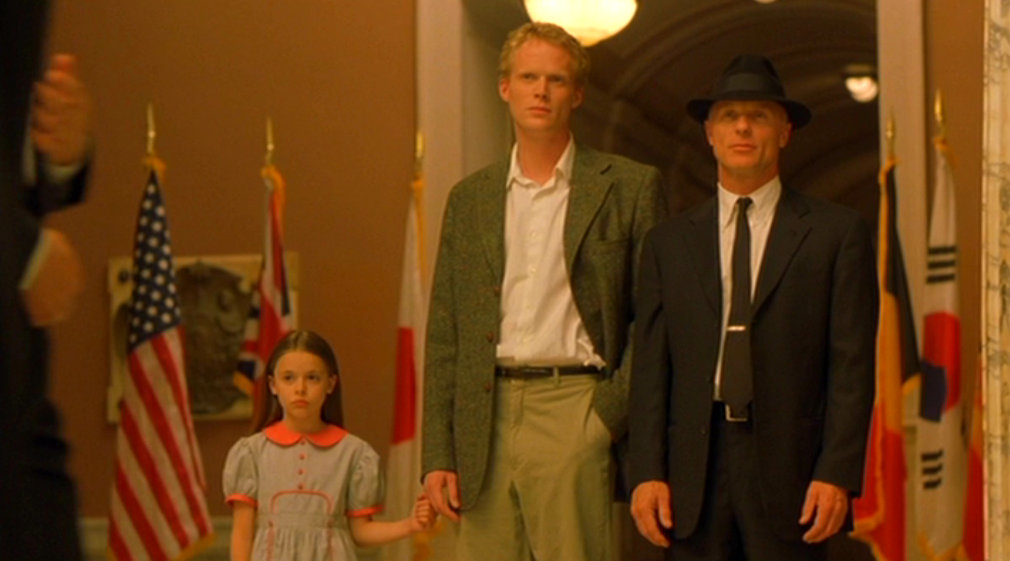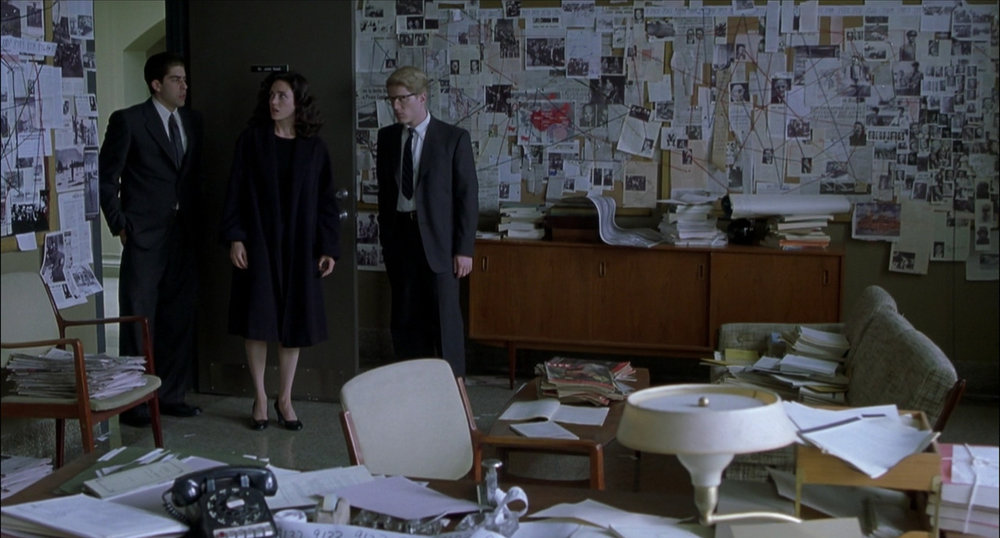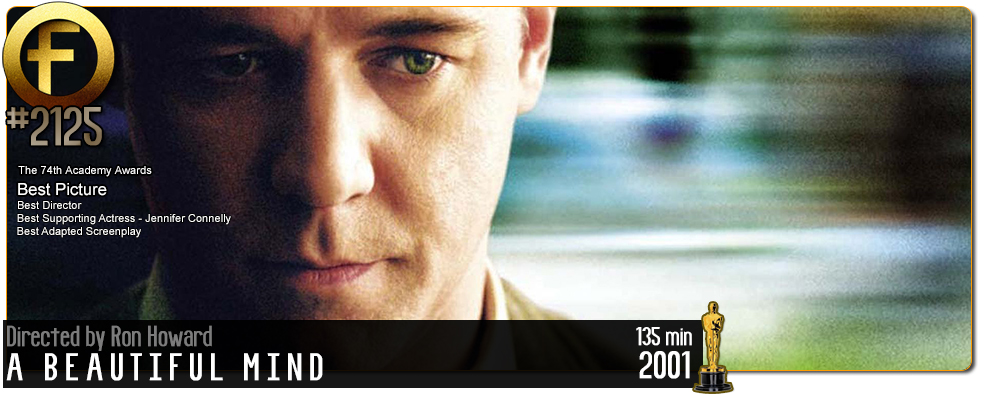Movie Review – A Beautiful Mind
Principal Cast : Russell Crowe, Jennifer Connelly, Ed Harris, Christopher Plummer, Paul Bettany, Adam Goldberg, Josh Lucas, Anthony Rapp, Jason Gray-Stanford, Judd Hirsch, Austin Pendleton, Vivien Cardone.
Synopsis: After John Nash, a brilliant but asocial mathematician, accepts secret work in cryptography, his life takes a turn for the nightmarish.
********
Following on from what is generally regarded to be one of the best Best Picture wins in recent times in Ridley Scott’s Gladiator, the Academy Awards would follow that up with a film I generally consider to be among the weakest. A Beautiful Mind, written by Oscar winner Akiva Goldsman and directed by fellow Oscar winner Ron Howard, is a very pretty, dramatically heady movie but it is by no means the best film of 2001 – I would have gladly accepted either Gosford Park, Moulin Rouge or The Fellowship of The Ring, as alternatives – and as a viewing experience is more frustrating than it is enlightening. A film of two distinct halves that tells a biographical account of the life of Nobel Prize-winning mathematician John Nash, played by Russell Crowe in his (get this!) third Oscar-nominated performance in three years (following 1999’s The Insider and his win for Gladiator), and co-starring Oscar winner Jennifer Connelly as Nash’s wife, Alicia, A Beautiful Mind is as schizophrenic as its subject matter and, no matter how hard it tries, is unable to overcome a laborious third act despite an incredibly strong start.

Math genius John Nash arrives at Princeton with the world at his feet, determined to publish his own original idea. This proves difficult at first, until the reclusive and withdrawn Nash has a flash of inspiration to a new concept of governing dynamics, which propels him to MIT and eventually a classified mission for the US Department of Defence, at the behest of Agent William Parcher. John meets and falls for a woman, Alicia (Connelly), whom he eventually marries, but is startled to discover that for a long time has been having vivid hallucinations of several people, including roommate Charles Herman (Paul Bettany) and his niece Marcee (Viviene Cardone) and Parcher; Nash is treated by psychologist Dr Rosen (Christopher Plummer) for his illness, much to the concern of his associates, in particular friends Richard Sol (Adam Goldberg) and Bender (Anthony Rapp), and at times finds the medication he is on diminishes his intellectual capabilities. As he learns to deal with his condition, he waxes and wanes with success as his visions continue to haunt him.

A tale of distinct thirds, A Beautiful Mind is one part period piece, one part schmaltzy romance, and another part weird mental health discussion. John Nash’s now famous battles with schizophrenia plagued him almost his entire adult life – he passed away in 2015 following a vehicle accident – and the film takes great pains to evoke and examine the toll on both he and that of his family, in particular Jennifer Connelly’s excellent portrayal of Alice Nash. Akiva Goldman’s Oscar-winning adapted screenplay is obviously adoring of its subject, and treats Nash with appropriate reverence and a distinct lack of flaws other than the obvious; the film is rooted in Nash’s delusions and in some ways tries to ape M Night Shyamalan’s Sixth Sense with regards to its “big reveal” about the nature of Herman and Parcher, only without the flair. Ron Howard, who was coming off an absolute golden streak following Apollo 13, Ransom, EDTv and The Grinch, delivers what I can only describe as the most mid-level directorial effort with this film, which makes me cringe even harder knowing he won the Oscar for his work here. There’s no real flair or dynamism here, from a director who knows how to pump up the audience, and although the scripts asks him for considerable restraint in terms of locations and dramatic work, you’d think there might be more depth to what he displays behind the camera. It just feels so… pedestrian.

The first half of the film is really quite good. The young Nash arrives at University, parlays his incredible mathematical mind to some manner of formulaic brilliance, meets hot women, says inappropriate things, and becomes swept up in an exotic mission for the DoD. Crowe plays Nash a little like Sheldon from The Big Bang Theory, literal and quite prone to verbal and physical gaffes, and he makes an engaging and highly sympathetic hero. The film’s early going is generally excellent at setting up Nash, his relationships, and playing with his innate brilliance despite what would become quite debilitating mental issues. Howard and Goldsman, together with a committed (lol) and earnest Crowe, give the film considerable dramatic urgency as Nash’s life looks to be heading into wild and exciting adventures. Once Nash is diagnosed with schizophrenia, and the full realization of his hallucinations becomes clear to the viewer, the film becomes a rote play-by-pay of medical, sociological and familial tropes as Nash’s life starts to come undone. The second half of this film, while competently made, is nowhere near as strong dramatically as the first half, and loses all sense of momentum as we wind our way towards the lengthy journey to Nash’s receiving of his Nobel Prize, a maudlin and overly sentimentalized series of sequences that feel awkward even now, and moreso thanks to wonky old-age makeup applied to both Crowe and Connelly.

The film also fictionalises a lot of Nash’s life, often for dramatic expediency but also in a manner I think attempts to soften the harshness of the man’s mental illness. These inherent inaccuracies tend to rob the film’s tragic potency of some of its power, more’s the pity, despite committed performances from all involved (Crowe is remarkably good) and limit how effective the legacy of the film might be, but if you parse away the fiction the story itself is quite strong. Knowing it’s a real one only adds to the lustre of the movie. A Beautiful Mind is worth noting for Roger Deakins’ superb cinematography, especially in the opening half, James Horner’s aching orchestral score, and the stunning production design of Wynn Thomas (not nominated, bizarrely), so even if the story falters considerably at least it’s still lovely to look at and listen to. Among the weakest of the Best Picture recipients of the new millennium, A Beautiful Mind isn’t a terrible film but as you’re watching it you can’t help but wonder why it won compared to the other films of that year, and that’s the unforgivable thing about it.

